Those blog readers who also receive our prayer letters will have noticed us mentioning 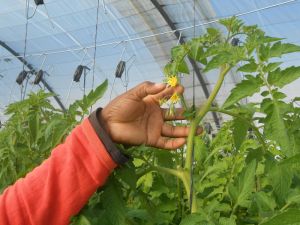 “Living Hope” or maybe “Living Way” and may be wondering what this is all about. So here is a very brief potted history of Living Hope and in particular the business training part of their work.
“Living Hope” or maybe “Living Way” and may be wondering what this is all about. So here is a very brief potted history of Living Hope and in particular the business training part of their work.
The Fish Hoek valley (“The Valley” to those of us who live here… there may be other valleys elsewhere in the world, but we doubt that they are of any particular interest) is home to several different communities:
Fish Hoek itself and Sun Valley – the town of the nearly deads and the newly-weds. The earlier part of the town was built to house ex-servicemen after the war, like my grandad. Since then the town has grown considerably, but it has remained popular as a retirement town, as the average age of residents here indicates. Young families are moving down from the Southern Suburbs (from Over The Mountain) because property prices are a little lower and the schools are good.
Kommetjie, Capri, Sunnydale – home to a mixture of surfers, families and those who epitomise the lifestyle here beyond the Lentil Curtain. For some reason (geographical? social?) the valley is home to quite a few people who are keen followers of new age beliefs, alternative (including some very alternative) medicine and some unusual spiritual beliefs.
Masiphumelele – the name is Xhosa for “we will succeed”, and this area is home to maybe around 40,000 people. It is hard to be sure as some of these are migrants from Malawi, Zimbabwe, the Democratic Republic of Congo or other nearby countries and not all of them have legal status. Some of the housing is brick built, but many homes are made from tin sheets, and the facilities in the town are severely overstretched. Poverty levels and unemployment are high. Of those who do have work, many are employed as casual labour on a day by day basis, often paid as little as £8 a day, in a country where food prices are not correspondingly low. Crime levels are high, and policing has been inadequate although is starting to improve slowly.
Ocean View – a rather misleading name as I am not sure that you can see the ocean from here. This area is where the Cape Coloured people who had been living elsewhere on the Southern Peninsula or further afield were forcibly relocated in the 1960’s. Drug use and alcoholism are rampant and gangs rage open warfare on the streets. A recent survey in Ocean View found that a number of primary school children had witnessed a shooting or seen a dead body. People living in Ocean View live in fear of being caught up in gang-related shootings, where passers-by are routinely shot to prevent them providing the police with witness statements. Ambulances called for victims of shootings are unable to attend without a police escort.
It is in the context of the poverty and despair of Masi and Ocean View that Living Hope was born. Pastor John Thomas from the Baptist church, King of Kings, founded the work which has grown to include hospice care, community based health care, TB and HIV screening, youth work, mother and baby groups, addiction support and the business training initiative. The goal behind this last one is to train and equip people who have no skills to be able to work to support themselves and their families. Many of the people living in Masi have come from rural areas to look for work. Many of them have smallholdings of land back in their home area, but do 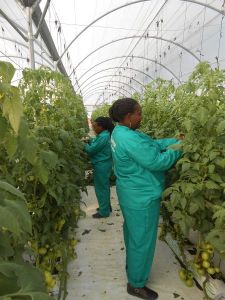 not have the skills to farm this land effectively and profitably. The Harvest Training Initiative, previously known as Living Way, trains people in business and agricultural skills so that they can use these skills either in agriculture or elsewhere. Those who have previously completed part or all of the course are now working in a number of areas:
not have the skills to farm this land effectively and profitably. The Harvest Training Initiative, previously known as Living Way, trains people in business and agricultural skills so that they can use these skills either in agriculture or elsewhere. Those who have previously completed part or all of the course are now working in a number of areas:
- chicken farming locally
- returned to rural areas in South Africa or elsewhere to farm their own land and teach others what they have learnt
- working on large-scale farms elsewhere, using the skills learnt (graduates of the training scheme are popular with farmers because of their skills)
- running a local fruit and vegetable stall, applying the business principles learnt
Running alongside the business skills is a strong Biblical emphasis. All students are required to attend an Alpha course during the first stage. Those who progress to the second stage attend daily devotions, a Bible study during the week and separate men’s and women’s discipleship classes with us on a Friday morning. The aim is for them to be trained not only in agricultural and business skills, but also to be equipped to live for Christ.
There is a wide range of future possibilities within the business training initiative, including short courses in IT, English, farming and cooking to name but a few. (Those who know me will be relieved to hear I am not going to be teaching the cooking!) But the vision is clear – whatever the course, there will always be Bible teaching as an integral part.
What have we been doing there?
Neil has run the Alpha course twice now and we are on our second group of discipleship students. Neil still keeps in contact with students who have left to encourage them, and I have been encouraging a young lady who completed stages 1-3 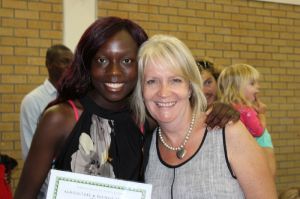 but did not continue to the final stage. She has now decided she would like to pursue a career in beauty therapy – hair, nails and massage. God has provided a wonderful lady from our church who is a highly skilled beauty therapist and who had been praying for an opportunity to give back in service into the community. She is providing some training, free of charge. And I have to be the practice case… another Indian head massage coming up tomorrow. It’s tough, but someone has to do it! Neil, on the other hand, gets drawn in at times to help with deliveries when people or vehicles let the side down. It has been a wonderful thing to see how God has opened up opportunities in this way. The course leaders are all men, but over half of the current student group are women, and so I have found myself drawn in to providing pastoral care and support for these ladies, some of whom face battles far beyond anything I have ever had to experience.
but did not continue to the final stage. She has now decided she would like to pursue a career in beauty therapy – hair, nails and massage. God has provided a wonderful lady from our church who is a highly skilled beauty therapist and who had been praying for an opportunity to give back in service into the community. She is providing some training, free of charge. And I have to be the practice case… another Indian head massage coming up tomorrow. It’s tough, but someone has to do it! Neil, on the other hand, gets drawn in at times to help with deliveries when people or vehicles let the side down. It has been a wonderful thing to see how God has opened up opportunities in this way. The course leaders are all men, but over half of the current student group are women, and so I have found myself drawn in to providing pastoral care and support for these ladies, some of whom face battles far beyond anything I have ever had to experience.
What are the highlights?
Many! Seeing the genuine love and respect that the students have for Neil at the graduation a few months ago. (The gentleman in the photo is Zex who has returned to Malawi fired up with enthusiasm to farm his land effectively and teach others from the Bible what God has taught him while he was here.) Realising that promising to pray for someone (and then doing it) is a huge e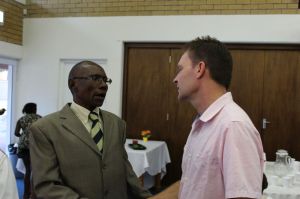 ncouragement to them… particularly when we are able to see God answer those prayers. Going to devotions and hearing a stage 4 student, Langa, share from the Bible with passion and enthusiasm. Seeing the love and support between the students. Having our eyes opened to a totally different cultural view on familiar Bible passages. Getting lots of hugs and being called “mom”. Chatting with Gerrit who has taken over leadership of this project and feeling his passion for Christ.
ncouragement to them… particularly when we are able to see God answer those prayers. Going to devotions and hearing a stage 4 student, Langa, share from the Bible with passion and enthusiasm. Seeing the love and support between the students. Having our eyes opened to a totally different cultural view on familiar Bible passages. Getting lots of hugs and being called “mom”. Chatting with Gerrit who has taken over leadership of this project and feeling his passion for Christ.
And the challenges?
Knowing where to target our involvement when there are so many things that could be done. Trying not to feel overwhelmed by the scale of the problems. Keeping our eyes fixed on Jesus and encouraging others to do the same.
This has been rather a long post. I do apologise for that. But if you have stayed the course and want to know more, there is a video below about the harvest training initiative. The lady, Patricia, was headhunted to work at a large farm on completion of stage 4. The gentleman, Einstein, is farming chickens locally and has a good reputation with local shops for the quality of his eggs. The guy with the strong accent is Gerrit… sorry, no subtitles!
Thank you for reading to the end. Thank you for your prayers.
https://youtu.be/FiHVuV6cMRc
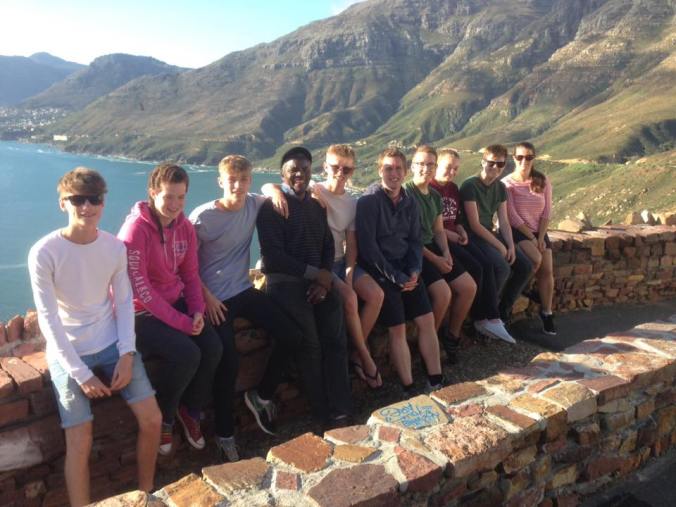 So, a week of highs and lows, and a reminder that we never know how many our days will be, but God has numbered each one and written them in His book. It matters far less whether we live to 99 or are taken at 19 – the only thing that matters is whether our eternity is secure in Christ.
So, a week of highs and lows, and a reminder that we never know how many our days will be, but God has numbered each one and written them in His book. It matters far less whether we live to 99 or are taken at 19 – the only thing that matters is whether our eternity is secure in Christ. to know that, even if the staff were as surly and uncooperative as rumour has it, I was unlikely to sustain any bullet wounds. As it turned out, the wait wasn’t tooooooooooo long although the deep sighs and occasional tuts from the lady next to me showed that clearly she felt differently. I didn’t get my problem resolved. To be honest, I really wasn’t expecting to… but I did have a nice chat with a totally charming guy and he gave me a form. Is it the right form? Only time and another trip back to the gun-free zone will tell.
to know that, even if the staff were as surly and uncooperative as rumour has it, I was unlikely to sustain any bullet wounds. As it turned out, the wait wasn’t tooooooooooo long although the deep sighs and occasional tuts from the lady next to me showed that clearly she felt differently. I didn’t get my problem resolved. To be honest, I really wasn’t expecting to… but I did have a nice chat with a totally charming guy and he gave me a form. Is it the right form? Only time and another trip back to the gun-free zone will tell.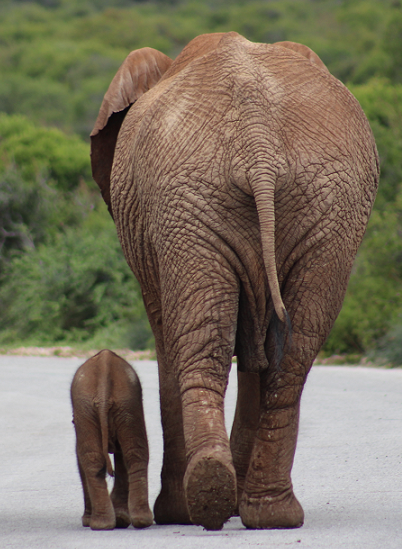









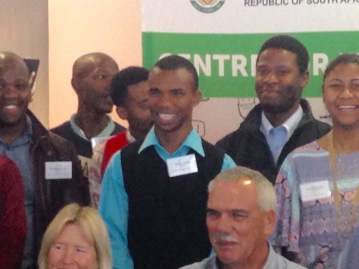







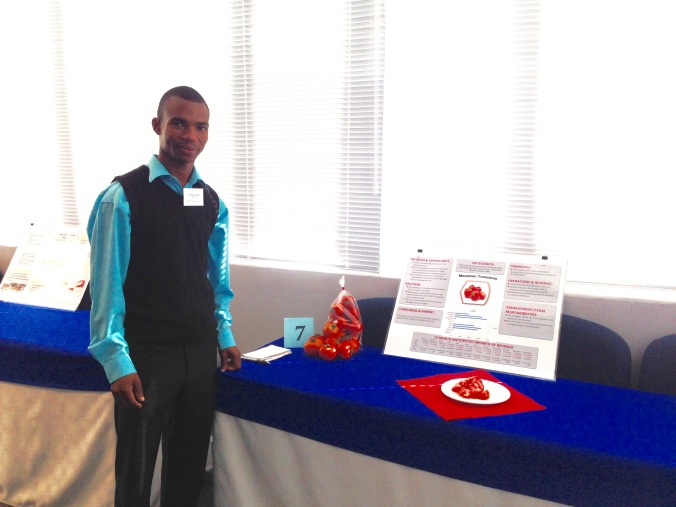 up for tasting, faced the onslaught of questions from college staff, families and friends of other contestants and of course… the judges. The standard of the entries was impressive with some very interesting and innovative ideas ranging from panel beating through to a language translation app. It was such a positive sight to see so many young people with viable business ideas, putting their heart and soul into trying to create small businesses.
up for tasting, faced the onslaught of questions from college staff, families and friends of other contestants and of course… the judges. The standard of the entries was impressive with some very interesting and innovative ideas ranging from panel beating through to a language translation app. It was such a positive sight to see so many young people with viable business ideas, putting their heart and soul into trying to create small businesses.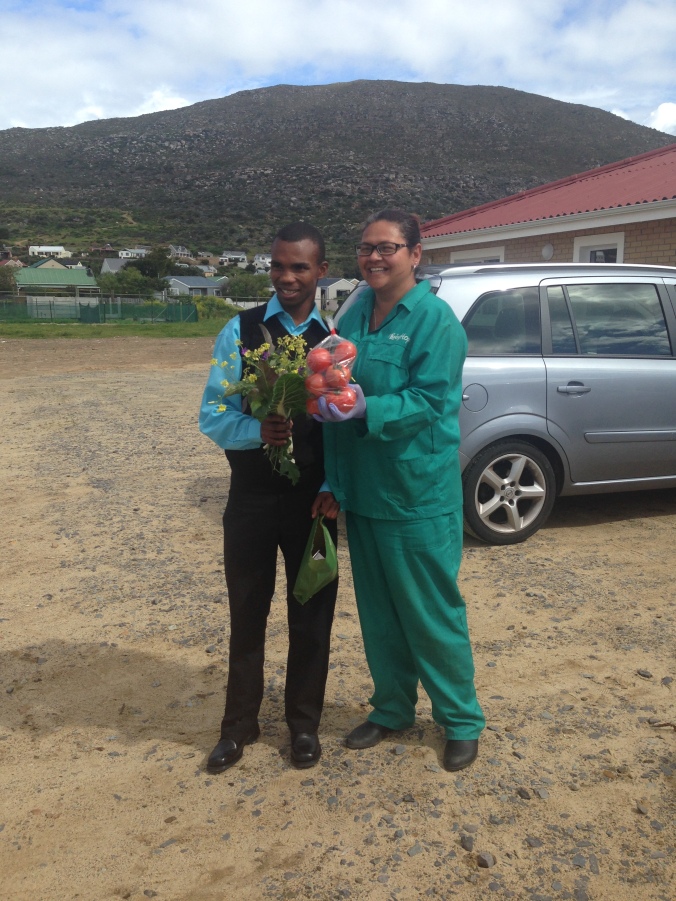
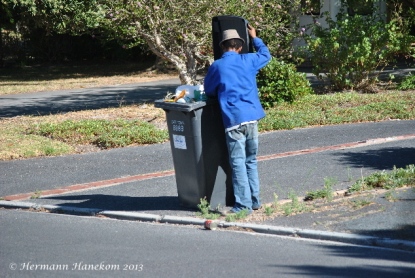 one thing is sure… pretty much as soon as the bin goes out, the bin pickers will arrive. It takes some getting used to seeing grown men and women carefully emptying out the contents of the wheelie bin, untying the bin bags and removing anything that might be edible, reusable or have some saleable value. Some householders will chase them away, claiming that they make a mess, but I have watched many times as they just as carefully put everything back in the bin. We, and many others, pack our wheelie bin accordingly. If we have any food items that are still edible, we keep them separate and put them in a plastic bag at the very top, or even on the lid. A friend of mine has just told me that she freezes little bits of leftovers that otherwise she would bin and puts these out on bin day, and I’m starting to do that too. Anything else that might be of interest, again we put in a plastic bag separately. And the bag is usually whisked away very promptly. The early bird most definitely catches the best bin pickings. I have often seen four or five different people come and check through our bin. The organised ones have a supermarket trolley which they load up with their findings.
one thing is sure… pretty much as soon as the bin goes out, the bin pickers will arrive. It takes some getting used to seeing grown men and women carefully emptying out the contents of the wheelie bin, untying the bin bags and removing anything that might be edible, reusable or have some saleable value. Some householders will chase them away, claiming that they make a mess, but I have watched many times as they just as carefully put everything back in the bin. We, and many others, pack our wheelie bin accordingly. If we have any food items that are still edible, we keep them separate and put them in a plastic bag at the very top, or even on the lid. A friend of mine has just told me that she freezes little bits of leftovers that otherwise she would bin and puts these out on bin day, and I’m starting to do that too. Anything else that might be of interest, again we put in a plastic bag separately. And the bag is usually whisked away very promptly. The early bird most definitely catches the best bin pickings. I have often seen four or five different people come and check through our bin. The organised ones have a supermarket trolley which they load up with their findings.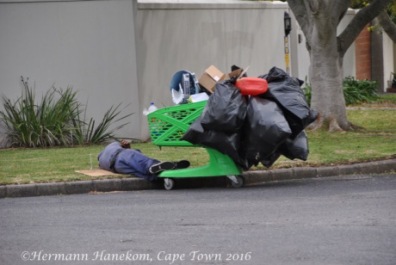




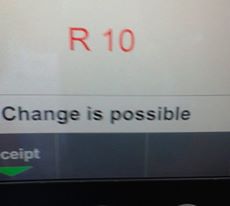
 churned up is only a few hundred metres, we still hold to the principle of the long wait. Which is fine. You turn off your engine, get out your book or pick up your phone and catch up on your social networking. Timing is everything, but totally out of your control. Firstly, there is the timing that allows you to join the queue at the right point so that you only have one 20 minute waiting spell, rather than a 20 minute wait, followed by a bit of driving, followed by a 20 minute wait again. Secondly, there is the timing that allows you a waiting spot with a good view. Hairdressers and Indian restaurant.. not bad. False Bay with the mountains beyond, and maybe even the occasional whale in season… much better. Portaloos…oh dear, but at least you are fairly near the front of the queue.
churned up is only a few hundred metres, we still hold to the principle of the long wait. Which is fine. You turn off your engine, get out your book or pick up your phone and catch up on your social networking. Timing is everything, but totally out of your control. Firstly, there is the timing that allows you to join the queue at the right point so that you only have one 20 minute waiting spell, rather than a 20 minute wait, followed by a bit of driving, followed by a 20 minute wait again. Secondly, there is the timing that allows you a waiting spot with a good view. Hairdressers and Indian restaurant.. not bad. False Bay with the mountains beyond, and maybe even the occasional whale in season… much better. Portaloos…oh dear, but at least you are fairly near the front of the queue.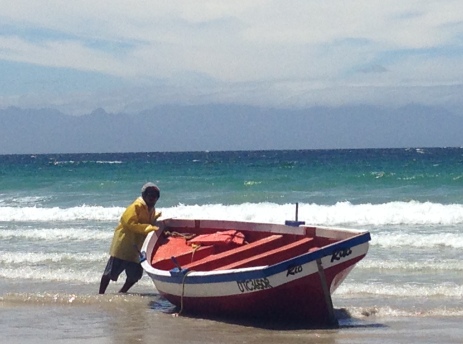 more flesh to the bones of this story, telling us how Jesus used Peter’s boat as a mobile pulpit in order to get a little breathing space from the crowds who were gathering to listen. When he had finished preaching, he told Peter to put out into deep water and let the boats down. Peter, weary from a night’s fishing with nothing to show for it, points out that this seems a little pointless but adds: “But because you say so, I will….” The nets are filled and Peter, convinced and convicted, leaves his livelihood and follows Jesus.
more flesh to the bones of this story, telling us how Jesus used Peter’s boat as a mobile pulpit in order to get a little breathing space from the crowds who were gathering to listen. When he had finished preaching, he told Peter to put out into deep water and let the boats down. Peter, weary from a night’s fishing with nothing to show for it, points out that this seems a little pointless but adds: “But because you say so, I will….” The nets are filled and Peter, convinced and convicted, leaves his livelihood and follows Jesus.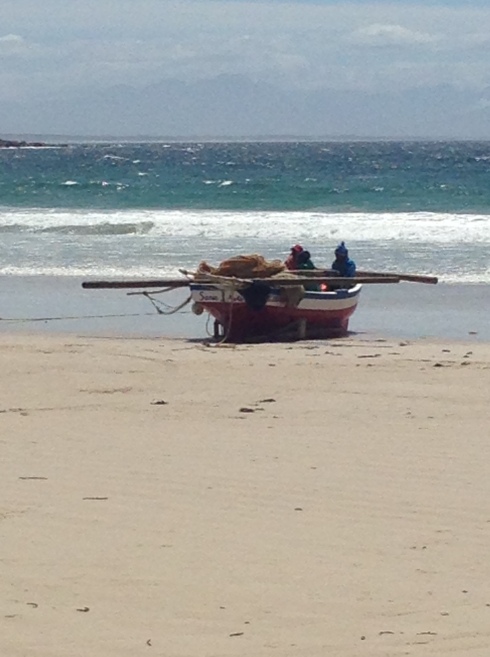 f the boat. We often focus on how he then took his eyes off Jesus and began to sink, but it’s worth noting that although his faith failed him once out on the water, he was the only one to say “if you say so, I will…” in that way.
f the boat. We often focus on how he then took his eyes off Jesus and began to sink, but it’s worth noting that although his faith failed him once out on the water, he was the only one to say “if you say so, I will…” in that way.